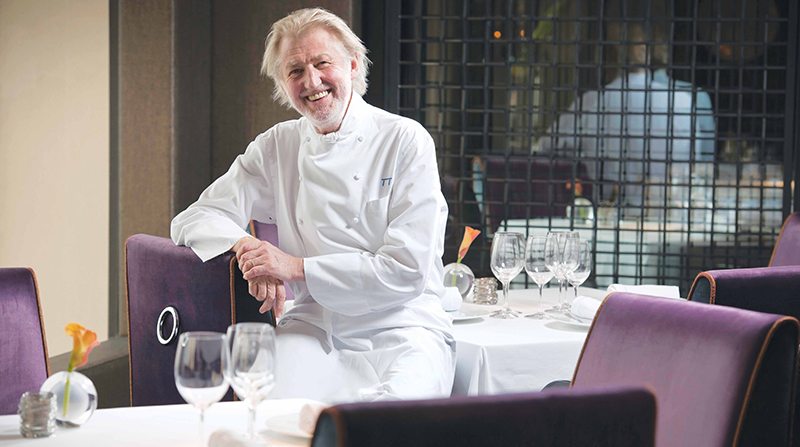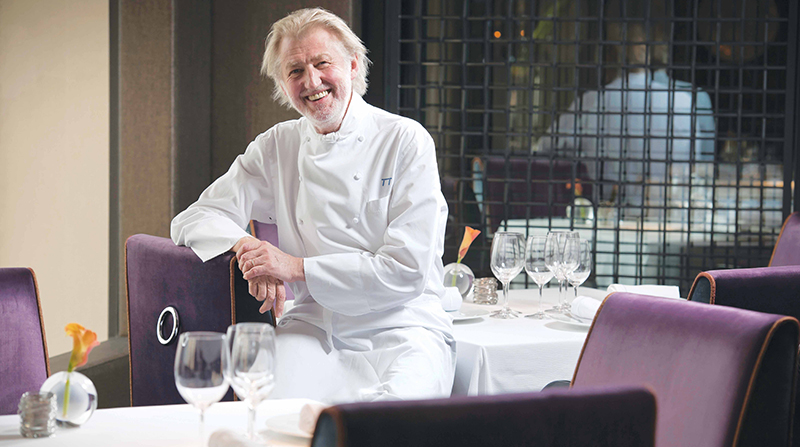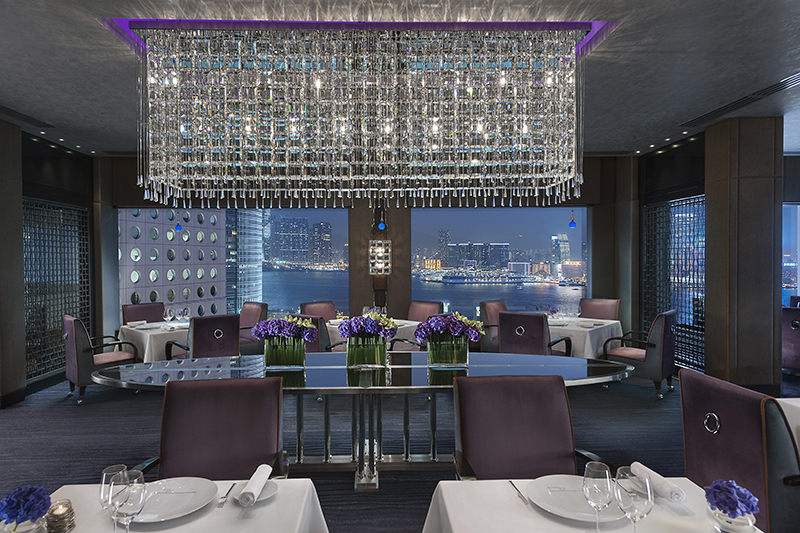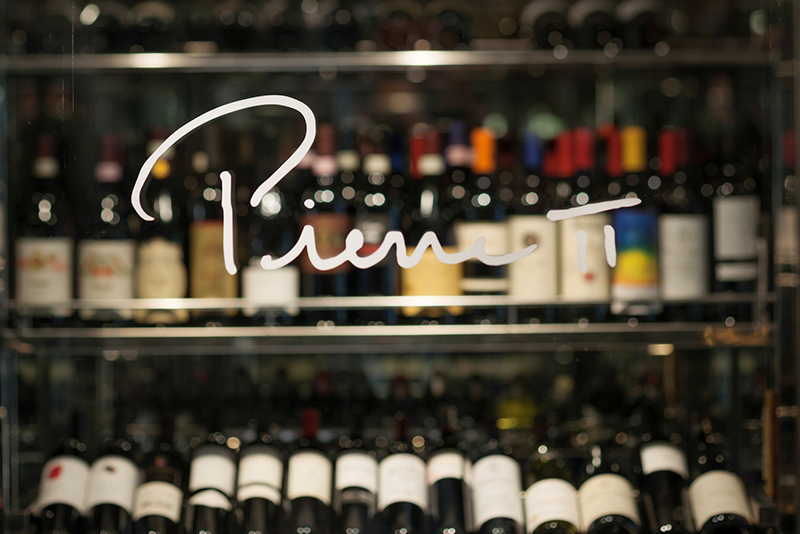
Pierre Gagnaire doesn’t sit still. The 67-year-old chef is easily among the most accomplished French toques in the world, boasting restaurants in epicurean hot spots like Berlin, Las Vegas, Paris and Shanghai. The Lyon native passed through Hong Kong last month to introduce his new autumn menu at Forbes Travel Guide Five-Star Pierre.
Known to embrace molecular techniques and unexpected flavor combinations, Gagnaire got his start as a teenager, when he joined the family restaurant Le Clos Fleury in Saint-Étienne, in Eastern France. Frustrated by the lack of creativity in traditional French cuisine, he left those familiar confines to work and travel the world.
Armed with renewed enthusiasm, he returned home and took over the reins at Le Clos Fleury and, in 1981, the chef opened his own eponymous eatery. With more room for innovation and artistry, Gagnaire thrived until 1996, when the restaurant closed due to financial troubles. He moved back to Paris and rebounded within the year, opening another spot that paved the way for his now-famous culinary empire.
Of course, Gagnaire can’t be at all of his restaurants at once. In Hong Kong, his protégé and chef de cuisine Jacky Tauvry runs the kitchen, collaborating with Gagnaire on a daily basis. Both chefs share a love of music, art and poetry — concepts that are evident in the flow of service and plating of dishes at Pierre.
On the 25th floor of the Five-Star Mandarin Oriental, Hong Kong, the chef sits down with his notebook and a large glass of lemon water to chat about his new menu, personal philosophy and the secret to a four-decades-long culinary career.
What do you remember about your earliest days in the kitchen?
I began training very, very early. I worked with [celebrated Lyon chef] Paul Bocuse when I was a teenager. I worked in Lyon for five years at different restaurants, then I joined the navy, where I was a chef and saved a lot of money.
After that, I moved to Paris for a year then traveled around the world. Finally, I came back to Lyon to be a chef at my family’s restaurant again. I stayed there a few years, but it was not the life I wanted.
Did you always want to be a chef?
No, not at all. It wasn’t my choice. It was the choice of my family and, at the very beginning, I really didn’t understand what I was doing there — I just picked up the family story. That was normal at the time; now it’s different.
But in France, you would usually follow the family business and work with your family. For my father, the restaurant was a good business. He has had a lot of success and won lots of awards. He made a lot of money with this restaurant.
It seems like a good place to work. Why didn’t you like it?
For me, I didn’t really get any pleasure from cooking the same Lyon dishes over and over again, and I didn’t feel like I had a mentor.
You know, in the ’70s, the cuisine was very traditional in France. The food was always the same dish, never any creativity. I didn’t start taking pleasure in my job until I could see the creativity and possibilities. That’s when I began to think this job is actually incredible. For me, it was a revelation.
When did you have the revelation?
When I was working with chef [Alain] Senderens [in Paris], I realized that I could do much more than I thought with cooking. There, I learned more about the creativity and the innovation.
Finally, I opened my own restaurant in 1981 and I continued to work for myself for the next 40 years. My restaurant in Saint-Étienne was beautiful. It was kind of a Danish style of architecture, with a skylight overhead that let the sun stream in from the sky. It was very simple, but it was beautiful and fresh.

An Autumn Selection from Pierre. Credit: Stephanie Teng
What did you do differently, once you were on your own?
I tried to follow my dreams. For me, it was combining the old recipes with something new. At the time, no one used curry, ginger or spices in French cuisine.
But immediately, I felt that you must imagine the world like a garden: You can cultivate a dish into something different. It was harder back then. We didn’t have as much access to information like we do now.
How has the internet changed things for chefs?
Now, you can search the internet or print off a recipe, or send an email. Back then, we didn’t know what other chefs were doing all over the world. It was interesting because you were actually very alone. But when you’re alone, it’s actually a good thing.
Since I had no outside information, I spent a lot of time alone, imagining my own way to cook. I spent a lot of money buying and sourcing new products, to introduce them to my dishes. Often, I would put the produce in the fridge, look at everything and say, “Well, what do I do with that?”
How else has the culinary industry changed?
I think there is less and less competence among younger chefs. Chefs don’t have time to actually be in the kitchen anymore, you know? They must make a TV show, star on camera, go to media interviews… But, as chefs, we need time to actually cook and be in our kitchens!
Some young chefs are very good, of course, but a lot of chefs are not able to create a compelling menu year after year. That is the hardest part about being a chef — to have the capacity of imagination, season after season, year after year. It’s a lot of work.
For Jacky, that is what I want. I want him to build his own story.
How do you work with Jacky from a distance?
Jacky and I have a great rapport; we share a story together. We always try to understand the city where we are working — to know the people in the city and the soul of the company with whom we partner.
So, for the Mandarin Oriental, of course, we find a balance between our philosophy, the company and what works for the soul of Hong Kong. We read, we work on the menus, we write down ideas in our notebooks.
What’s your personal philosophy, as a chef?
My goal is to keep my art in the kitchen. My guests are very important, but so is my staff. I want to keep my team happy, and then my guests will be happy.
I tell all of my colleagues that we must have passion — and with passion we will have pleasure to work, to create something, it’s not just a show, it’s a sense of purpose. The most important thing is the work and the quality.
How do you continue to innovate year after year?
It’s self-discipline and the capacity to stay focused on your vision, on your objective, to know where your talents lie.
I find inspiration everywhere — it’s impossible to explain. Sometimes it’s easy, other times more difficult. I try to concentrate. To maintain the pleasure and the energy in my work, it helps to keep my private life healthy, quiet and stable. Your family is important, and your romance is important. Above all, I try to remain consistent.
How do you come up with new ideas?
That’s quite the secret! You must pay a lot of money to know that. But I can tell you, when I organize a menu, the first thing I do is start with a great product. It must be in season and make sense for the environment.
Then you find a good balance, something elegant, the right textures, flavors and techniques. It’s just like getting dressed in the morning — some things go together, some things don’t.
What dish are you most excited about this season?
Perhaps the grouse. It’s from Scotland. I love this bird: it’s very tender, very tasty and I’m happy to see that people love it here in Hong Kong.
I was afraid that people wouldn’t like it, because it has a special, strong, gamey taste. It’s rich and you can feel the herbs that the bird ate. I simply love this dish.



